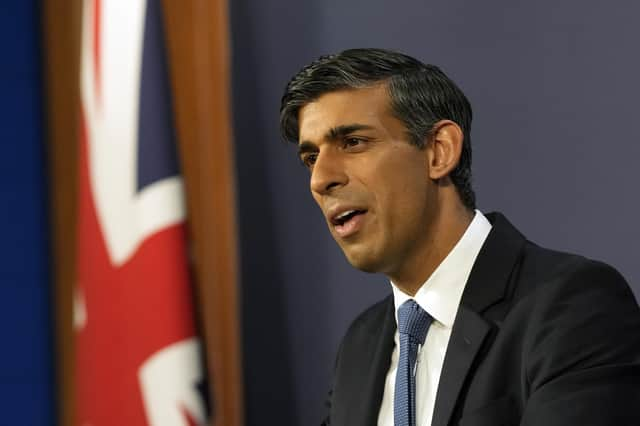Owen Polley: Comforting words on Northern Ireland's place in the Union won’t solve problems with trade and sovereignty


Sir Jeffrey Donaldson told the Northern Ireland Affairs Committee that his party would give the government a chance to respond, but that any outcome would be “a matter for public record”.
He spoke to the committee a day after endorsing a paper by the Centre for Brexit Policy think-tank, that advocated replacing the Northern Ireland Protocol with a system of “mutual enforcement” for trade regulations. Under such a set-up, the UK government would enforce Brussels’ rules for British exports to the European Union and penalise any breaches through its courts. The EU, for its part, would ensure that companies in its jurisdiction met British rules when they sold goods to the UK.
Advertisement
Hide AdAdvertisement
Hide AdThe DUP leader told the launch event on Tuesday that the proposals could provide a “stable foundation” for the restoration of Stormont. The government, though, is unlikely to reopen negotiations with the EU. It will continue to insist, against a growing volume of contrary evidence, that the Windsor Framework removed “any sense” of a border between Great Britain and Northern Ireland.
The Secretary of State, Chris Heaton-Harris, said last week that, while negotiations are continuing to get power-sharing back, he will not “give a running commentary” on their progress.
Many commentators assume that, while the government will not change the framework, it may persuade the DUP back into the executive by passing reassuring legislation. This could consist of a guarantee that Northern Ireland’s integral place in the UK internal market would be respected.
It’s difficult to see what that could add to the Internal Market Act 2020, which was passed by Boris Johnson’s administration. After the then secretary of state, Brandon Lewis, claimed that the legislation would “break international law in a specific and limited way”, it was defeated in the House of Lords and its clauses on Northern Ireland were diluted.
Advertisement
Hide AdAdvertisement
Hide AdHowever, the eventual act still committed any “appropriate authority” to take decisions in a way that would “maintain Northern Ireland’s place in the United Kingdom’s internal market” and “respect Northern Ireland’s place as part of the customs territory of the United Kingdom”. It also alluded to “the need to facilitate the free flow of goods between Great Britain and Northern Ireland”, as well as promising “unfettered access” to the UK market for Northern Irish goods.
None of these clauses stopped the government from operating the Irish Sea border or adding to it through the Windsor Framework. It is possible - indeed it is overwhelmingly likely - that new legislation would be equally vague and difficult to enforce.
In its various guises, more vocally than any administration in living memory, this Conservative government has declared its support for “our precious Union” and insisted that it will “never be neutral” on Northern Ireland’s place in the UK. Yet, it has also done more to make us an anomaly within our own nation, turn us into a constitutional hybrid and loosen our economic and political ties to Great Britain.
None of the issues that the protocol created around trade and sovereignty will be solved by more comforting but ultimately meaningless language about this province’s integral place in the Union.
Advertisement
Hide AdAdvertisement
Hide AdAt the Westminster committee meeting, Sir Jeffrey Donaldson was keen to emphasise that, should devolution return, the DUP will nominate a deputy first minister. He stressed: “We are very clear about that. That is not the issue for us.”
Throughout this impasse, nationalists, and even some unionists, have implied that the DUP wants primarily to prevent Michelle O’Neill becoming first minister, rather than change the protocol. This line of argument, especially coming from other pro-Union politicians, downplays the seriousness and significance of being economically and politically cut off from the rest of the UK.
It’s fair to claim, of course, that the DUP has been inconsistent and ineffective at opposing the Irish Sea border, throughout the negotiations leading up to the protocol and since. It’s legitimate to question whether its boycott of the institutions has become counter-productive, and ask whether it is now damaging the Union.
It’s absolutely not reasonable to insinuate that the Irish Sea border is only one important issue among many, or imply that it is too trivial to explain the party’s boycott. That line of thinking suggests that some politicians either do now understand how gravely Northern Ireland’s place in the UK has been undermined, or are not prepared to risk explaining it to voters.
Advertisement
Hide AdAdvertisement
Hide AdIt’s been suggested again this week that the DUP is divided on whether to compromise on the protocol and restore Stormont. That could be the case, but the party has set out core aims as regards the Irish Sea border. If it ditches these, it must explain its reasoning openly to the electorate, rather than rely on ambiguity or subterfuge.
There are now unlikely to be any meaningful moves toward reviving power-sharing before September, with the July parades starting in Northern Ireland and the summer recess at Westminster coming later this month. While the secretary of state declined to give a ‘running commentary’ on the negotiations and Sir Jeffrey Donaldson granted the government time to digest his party’s plan, at some point the public deserves to know what the DUP has asked for and what Rishi Sunak is (or isn’t) prepared to give.
See also: